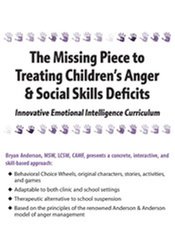

Emotionally Intelligent Children: Less Anger AND Improved Social Skills
The most misunderstood and poorly executed intervention is anger management. The most sought after, and most varied intervention for children is social skills. But why is this the case? Why aren’t these topics more frequently intertwined? And why do we wait so long to provide children support in this area?
Learn how to effectively use an emotional intelligence curriculum, designed by your instructor, to effectively address both anger and social skills deficits. You will discover the benefits of this curriculum for children as young as 4 years old, and how it helps them manage their anger, cope with disappointments and frustrations, and even learn how to be good friends. Case studies and group roleplays will give you a much deeper understanding and appreciation for how to use stories, illustrations, and re-enforcers to teach the Good Choice Wheel, a visual tool that embodies 4 coping strategies that every child needs.
This online program is worth 6.0 hours CPD.
| File type | File name | Number of pages | |
|---|---|---|---|
| Manual - The Missing Piece to Treating Children’s Anger (1.11 MB) | 53 Pages | Available after Purchase |
Bryan Anderson, MSW, LCSW, CAMF, is a behavioral therapist and clinical social worker who provides treatment for children, adolescents and adults diagnosed with autism, anxiety, OCD, depression, anger issues and more. His practice specializes in working with autism, anxiety, OCD, depression, anger issues and more. His practice specializes in working with behavioral, cognitive, academic, social and occupational functioning with his clients. Bryan teaches weekly social skills groups and is well known for applying strategies to reduce anxious, angry, and aggressive behaviors. He is the author of Grab the Wheel: Helping Young Children Manage Explosive Anger™, an interactive anger management and social skills curriculum for all children, including children with Autism Spectrum Disorders (ASD), in school or clinic settings. The curriculum is co-authored by leading UCLA researchers Dr. Stephanny Freeman and Dr. Tanya Paparella. Bryan co-authored a study on Comorbid Psychiatric Disorders in Preschoolers with Autism that was published in Behavior Disorders in 2010. A certified facilitator trained in the UCLA PEERS Social Skills model, he also is adept at providing social skills to children and teens on the Autism Spectrum.
Bryan trained and worked at the University of California, Los Angeles in the Early Childhood Partial Hospitalization Program (ECPHP), an internationally renowned clinic that treats young children with Autism Spectrum Disorder. He received his Masters from Columbia University School of Social Work where he trained as a therapist for children and adolescents at the Child & Family Institute of St. Luke’s Roosevelt Hospital Center. While at the St. Luke’s Child & Family Institute, Bryan created and led an anger management skills group for children 8-10 with mixed diagnoses, using his own curriculum as the primary model.
Speaker Disclosures:
Financial: Bryan Anderson is the owner of Grab the Wheel Kids; and Vice President of Anderson & Anderson. He receives a speaking honorarium from PESI, Inc. He has no relevant financial relationships with ineligible organizations.
Non-financial: Bryan Anderson has no relevant non-financial relationship to disclose.
THEORETICAL BACKGROND AND BASICS OF MODEL
THE ROOTS OF ANDERSON & ANDERSON IN ANGER MANAGEMENT INTERVENTION AND EMOTIONAL INTELLIGENCE COACHING
ANGER (AND OTHER CHALLENGING BEHAVIORS) IN CHILDREN
MOST COMMON CHILDHOOD CHALLENGES THAT CAUSE ANGER AND SOCIAL PROBLEMS
GRAB THE WHEEL™ CURRICULUM
CASE STUDIES AND GROUP ROLEPLAYS
Satisfaction Guarantee
Your satisfaction is our goal and our guarantee. Concerns should be addressed to info@pesi.co.uk or call 01235847393.
Please wait ...